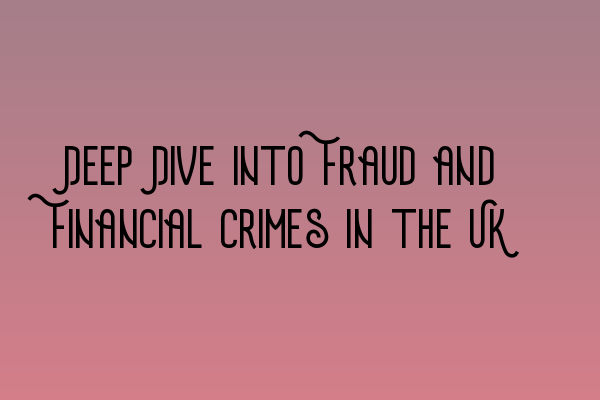Deep Dive into Fraud and Financial Crimes in the UK
Welcome to the SQE Criminal Law & Practice Law UK blog! Today, we will be taking a deep dive into the complex and intricate world of fraud and financial crimes in the United Kingdom. As a solicitor, it is crucial to stay up-to-date and knowledgeable about criminal laws, especially in areas where white-collar crimes are prevalent.
The Scope of Fraud and Financial Crimes
Fraud and financial crimes encompass a wide range of illegal activities, such as money laundering, bribery, tax evasion, insider trading, and embezzlement. These crimes involve deceit, manipulation, and exploitation of financial systems for personal or organizational gain.
Understanding the scope of fraud and financial crimes is vital for solicitors working in criminal law. By familiarizing yourself with the various types of offenses, you will be better equipped to defend your clients or prosecute the perpetrators.
Challenges in Investigating and Prosecuting Fraud and Financial Crimes
Investigating and prosecuting fraud and financial crimes can be highly complex due to the sophisticated techniques and technology used by criminals. As a solicitor, you need to understand the challenges involved in gathering evidence, identifying key players, and presenting a strong case in court.
One way to enhance your expertise is by attending workshops and seminars on criminal practice. These events provide valuable insights into the latest investigation techniques, case studies, and legal strategies used in fraud and financial crime cases.
Updates in UK Criminal Laws
To stay informed and prepared, it is essential to keep track of the updates in UK criminal laws related to fraud and financial crimes. The legislative landscape is continually evolving, and as a solicitor, you must be aware of changes in regulations, precedents, and legal interpretations.
By regularly educating yourself on updates in criminal laws, you will be better equipped to navigate the complex legalities surrounding fraud and financial crimes. This knowledge will help you build persuasive arguments, protect your clients’ rights, and achieve the best possible outcomes.
Enhancing Your SQE Criminal Law Study Group Experience
Studying criminal law in a group setting can be highly beneficial, providing opportunities for discussion, collaboration, and enhanced learning. To make the most of your SQE criminal law study group experience, consider incorporating discussions and case studies related to fraud and financial crimes.
Explore our article on enhancing your SQE criminal law study group experience for practical tips and resources to facilitate meaningful discussions and insights on fraud and financial crimes. By engaging with peers and sharing knowledge, you can gain a comprehensive understanding of the subject matter.
Decoding Criminal Evidence Rules
Understanding the rules surrounding criminal evidence is crucial in successfully prosecuting or defending fraud and financial crime cases. Decoding criminal evidence rules requires a detailed analysis of legislation, case law, and legal principles.
By delving into the intricacies of criminal evidence rules, you will be better equipped to identify weaknesses in the prosecution’s case, challenge evidence, and present strong arguments in court. This article provides valuable insights and guidance on navigating the complexities of evidentiary rules.
Public Prosecutions in the UK
While fraud and financial crimes can be pursued by private individuals, public prosecutions play a crucial role in prosecuting offenders on behalf of the state. Understanding the procedures, responsibilities, and challenges faced by public prosecutors is essential for solicitors specializing in fraud and financial crime cases.
To gain a closer look at state prosecution and its impact on fraud and financial crimes, read our article on public prosecutions in the UK. Explore the roles of key players, the burden of proof, and the significance of effective communication to establish a successful prosecution.
In conclusion, fraud and financial crimes pose significant challenges to solicitors practicing criminal law in the UK. By continuously expanding your expertise through workshops and seminars, staying updated on criminal laws, enhancing your study group experience, decoding evidentiary rules, and understanding the dynamics of public prosecutions, you will be better equipped to handle complex and high-stakes cases. Remember, the key to success lies in continuous learning and a deep understanding of the subject matter.
